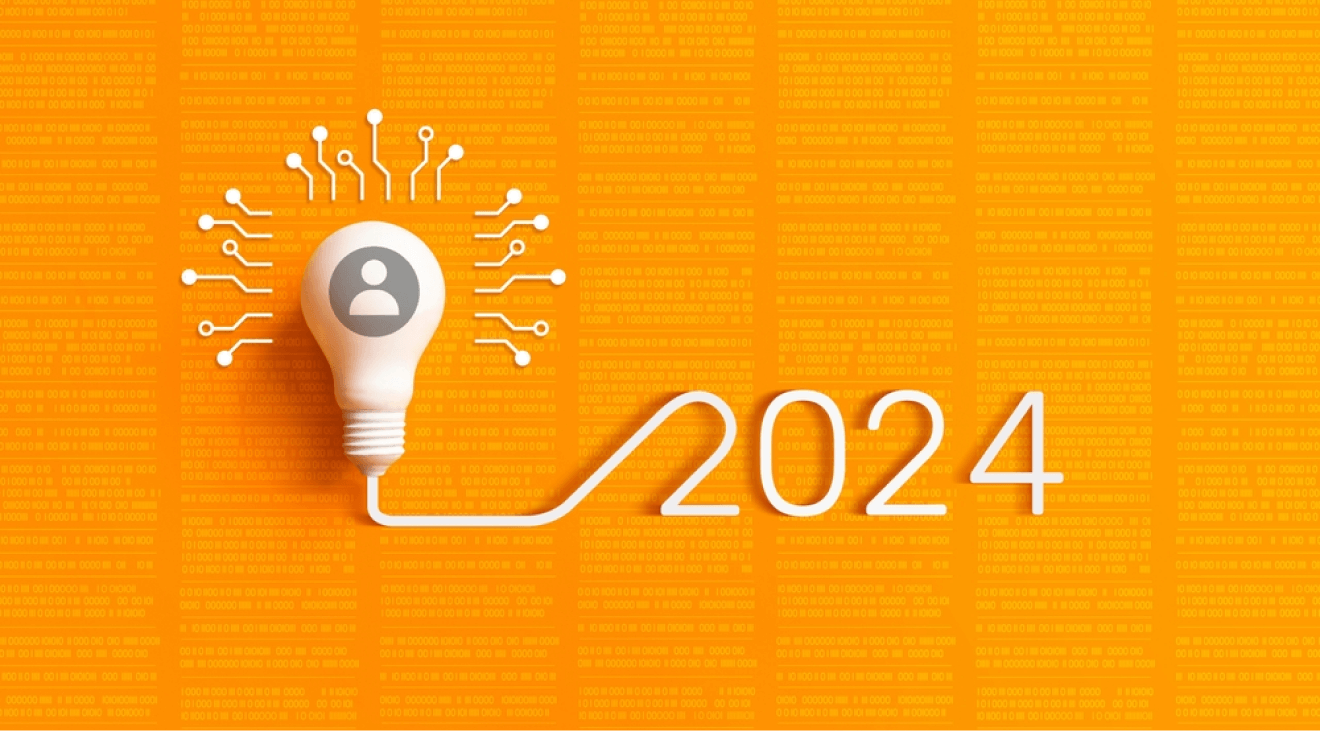Top 17 HR trends that will matter for the rest of 2024 and beyond

Admit it, you've scrolled through countless articles promising to unlock the "secret" to a perfect work-life balance. Or maybe you've daydreamed about a robot colleague who never misses deadlines (and never complains about bad coffee).
Well, worry no more because the future of work is here, and it's surprisingly less dystopian (and caffeinated) than you might think!
Buckle up, the HR tech superheroes (and curious employees alike), because we're diving headfirst into the top 17 trends that are poised to reshape the way we work – not just for the rest of 2024 but for years to come.
This isn't your average snooze-fest of industry jargon. We're talking AI assistants that handle the mundane (so you can focus on the magical), a hidden workforce brimming with untapped potential, and a much-needed shift from "work-life balance" to a more holistic "work-life fit."
So, ditch the spreadsheets and dust off your innovation cape – it's time to reimagine the future of work together!
Does HR trends even matter in 2024?

HR trends matter significantly in 2024 as they shape how organizations manage their most valuable asset: their people's human capital. The modern workforce is evolving rapidly, driven by technological advancements, changing employee expectations, and global economic shifts.
Some key HR trends, such as remote and hybrid work models (According to Forbes, 73% of workers have a hybrid or fully remote schedule), emphasize the need for flexibility and work-life balance, which are critical for attracting and retaining top talent.
Additionally, the integration of AI and automation in HR processes enhances efficiency and decision-making, allowing HR professionals to focus on strategic initiatives rather than routine administrative tasks.
Diversity, equity, and inclusion (DEI) initiatives remain pivotal, fostering a culture of belonging and improving organizational performance. Upskilling and continuous learning programs are essential to keep pace with technological changes and maintain a competitive edge.
Employee well-being and mental health support are also at the forefront, highlighting the importance of a holistic approach to employee care. By staying attuned to these trends, organizations can create a more agile, inclusive, and productive work environment, ultimately driving long-term success and sustainability.
Ignoring these trends can result in a disengaged workforce, higher turnover rates, and a diminished ability to compete in the global market.
What will HR look like in the rest of 2024?

HR in the remainder of 2024 will continue to evolve, influenced by ongoing technological advancements, changing workforce dynamics, and heightened focus on employee well-being. Here are some key aspects of what HR trends in 2024 will look like:
- Remote and hybrid work: The flexibility of remote and hybrid work models will become the norm. HR will focus on creating policies and practices that support distributed teams, ensuring productivity, engagement, and collaboration regardless of location.
- Technology and automation: AI and automation will become more common in HR processes, streamlining tasks such as recruitment, onboarding, performance management, and employee feedback. This will enable HR professionals to dedicate more time to strategic initiatives and employee development.
- Employee experience and engagement: Enhancing the overall employee experience will be a priority. HR will implement personalized and data-driven approaches to understand and improve employee satisfaction and engagement, leading to higher retention rates.
- Diversity, equity, and inclusion (DEI): DEI initiatives will remain critical as data shows that the most gender-diverse companies outperform the least gender-diverse companies by 48%. HR will continue to develop and implement strategies that promote a diverse and inclusive workplace, addressing biases and fostering a culture of belonging.
- Learning and development: Continuous learning will be emphasized, with HR facilitating upskilling and reskilling programs to keep pace with technological advancements and industry changes. Personalized learning paths and career development opportunities will be key.
- Mental health and well-being: Employee well-being will be a central focus. HR will introduce comprehensive wellness programs that address mental health, work-life balance, and overall well-being, recognizing their impact on productivity (Organizations with a standardized onboarding process experience 50% greater new-hire productivity) and engagement.
- Data-driven decision-making: HR will increasingly rely on data analytics to make informed decisions. Metrics on employee performance, engagement, and retention will guide strategic planning and organizational improvements.
- Flexible benefits and compensation: Customizable benefit packages will become more common, allowing employees to choose options that best suit their needs. This flexibility will be a key factor in attracting and retaining talent.
Top 17 HR trends that will matter for 2024 and beyond!

Here are 17 HR trends that will matter in 2024 and beyond.
1. Gig economy integration
Organizations will increasingly embrace gig workers and freelancers to supplement their workforce. HR will develop strategies to effectively manage this diverse talent pool, including tailored contracts, performance management systems, and integration processes to ensure gig workers feel valued and aligned with company goals.
2. Employee advocacy programs
HR will create structured programs encouraging employees to share positive experiences and company achievements on social media and other platforms. This will involve training employees in employer brand messaging, providing incentives for participation, and leveraging their networks to enhance employer branding and attract talent.
3. Environmental, social, and governance (ESG) focus
HR will lead initiatives to integrate ESG principles into corporate and organizational culture throughout. This includes developing sustainability programs, promoting ethical business practices, and engaging in community outreach. HR will also track and report on ESG metrics, demonstrating the organization’s commitment to responsible practices.
4. Advanced people analytics
HR teams will utilize sophisticated analytics tools to gain deeper insights into workforce trends. Predictive analytics will help in identifying potential turnover risks, understanding employee sentiment, and improving recruitment strategies. This data-driven approach will support more strategic decision-making and proactive HR management.
5. Neurodiversity inclusion
HR will implement policies and programs to support neurodiverse employees, such as tailored onboarding processes (69% of employees say that they are likely to stay and work for a company for 3 years if they have a great onboarding experience), customized workspaces and specialized training for managers.
This focus on neurodiversity in the modern workplace will help harness the unique talents of these individuals, fostering a more inclusive and innovative workplace.
6. AI in talent acquisition
AI will play a pivotal role in streamlining the recruitment process. Automated systems will handle initial candidate screening, resume parsing, and even initial interviews, reducing bias and improving efficiency. AI will also provide data-driven insights to refine job descriptions and identify the best sources of talent.
7. Hyper-personalized employee journeys
HR will design highly personalized career paths for employees based on their skills, preferences, and career goals. This involves using AI to recommend training programs, mentorship opportunities, and project assignments, ensuring each employee's experience is uniquely tailored to their aspirations.
8. Collaborative workspaces
Even in remote work environments, companies will invest in digital tools and physical spaces that facilitate collaboration. This includes virtual reality meeting rooms, interactive whiteboards, and collaborative software platforms that enable seamless communication and teamwork across different locations.
9. Blockchain for HR
Blockchain technology will be utilized for secure and transparent HR processes. This includes creating immutable records for employee credentials, streamlining payroll through smart contracts, and ensuring data integrity in performance evaluations and compliance reporting.
10. Health and safety tech
Wearable technology, such as fitness trackers and smart clothing, will be used to monitor employee health and safety. These devices can provide real-time data on physical well-being, detect potential hazards, and alert employees and managers to take preventative actions, thereby reducing workplace injuries and promoting overall health.
11. Cultural intelligence
HR will emphasize the importance of cultural intelligence through comprehensive training programs. Employees will learn to navigate cultural differences, enhance their communication skills, and develop empathy towards colleagues from diverse backgrounds, improving collaboration and global teamwork.
12. Flexible work schedules
Beyond remote work, flexible work hours and flexible working arrangements will become more common. HR will implement policies that allow employees to choose their working hours, enabling them to balance personal commitments and work responsibilities. This flexibility can lead to increased job satisfaction and productivity.
13. Pay transparency
Organizations will adopt transparent compensation practices, providing employees with clear information about how salaries are determined. This includes publishing salary ranges for positions, explaining pay decisions, and ensuring consistent and fair compensation practices across the organization.
14. Microlearning platforms
HR will invest in microlearning platforms that offer short, focused learning modules. These platforms allow employees to engage in continuous learning without the need for lengthy training sessions. Microlearning can be easily integrated into daily routines, enhancing skill development and knowledge retention.
15. Strategic workforce planning
HR will align workforce planning with long-term business goals, anticipating future skill requirements and potential talent shortages. This involves scenario planning, succession planning, and developing a full talent development pipeline to ensure the organization is prepared for future challenges and opportunities.
16. Voice of the employee (VoE) programs
Structured VoE programs will be implemented to regularly gather employee feedback through surveys, focus groups, and suggestion boxes. HR will analyze this feedback to identify trends, address concerns, and make data-driven improvements to workplace policies and practices, enhancing employee engagement and satisfaction.
17. Global talent pools
Companies will expand their talent acquisition strategies to tap into global talent pools. This involves using advanced recruitment technologies to identify and engage candidates from different geographic locations, providing support for remote work, and creating inclusive policies that cater to a diverse international workforce.
What are the people analytics trends in 2024 that one should stay on top of?

People analytics is rapidly evolving, and staying on top of the latest trends in 2024 is crucial for HR professionals aiming to leverage data for better decision-making. Here are five key people analytics trends to watch:
1. Predictive analytics for talent management
Predictive analytics will become increasingly sophisticated, enabling HR to forecast employee performance, turnover, and engagement levels.
By analyzing historical data and identifying patterns, organizations can proactively address potential issues, such as identifying employees at risk of leaving and implementing retention strategies or predicting which candidates are likely to succeed in specific roles.
2. Real-time analytics and dashboards
The demand for real-time analytics and interactive dashboards will grow. HR professionals will use these tools to access up-to-date information on key metrics such as employee satisfaction, productivity, and absenteeism.
Real-time insights allow for more agile and responsive HR management, enabling quick adjustments to strategies and policies based on current data.
3. Employee sentiment analysis
Advanced sentiment analysis tools will be used to gauge employee morale and engagement by analyzing communication patterns, survey responses, and social media activity.
This trend involves leveraging artificial intelligence, natural language processing (NLP), and machine learning to interpret textual data and provide actionable insights into how employees feel about their work environment, leadership, and overall company culture.
4. Diversity, equity, and inclusion (DEI) analytics
63% of respondents to a study reported that they would rather work for a company that prioritizes DEI over one that doesn’t. So, it is important for organizations to use analytics to track and measure DEI initiatives.
This involves analyzing data related to hiring, promotions, pay equity, and employee demographics to identify disparities and monitor progress toward DEI goals. By uncovering biases and gaps, companies can implement targeted interventions to foster a more inclusive workplace.
5. Personalized employee development plans
People analytics will enable the creation of highly personalized development plans for employees. By analyzing data on skills, career aspirations, performance, and learning preferences, an HR professional can tailor training programs and career paths to individual needs.
This trend supports continuous learning and development, helping employees achieve their full potential and align their growth with organizational goals.
How important is employee engagement going to be for the rest of 2024?

Employee engagement will be critically important for the rest of 2024, playing a pivotal role in organizational success. In an era marked by rapid technological advancements, remote and hybrid work models, workforce costs, and shifting employee expectations, maintaining high levels of engagement is essential.
Engaged employees are more productive, motivated, and committed to their organizations, directly impacting overall performance and profitability.
The competitive talent and labor market will heighten the focus on employee engagement in 2024. Organizations that prioritize engagement will be better positioned to attract and retain top talent, reduce turnover costs, and foster a loyal workforce.
Moreover, engaged employees are more likely to contribute to a positive work culture, driving innovation and collaboration.
Additionally, the well-being and mental health of employees will be closely linked to engagement. Companies that actively support their employees' well-being will see higher engagement levels, leading to improved job satisfaction and reduced burnout.
By investing in comprehensive engagement strategies, such as personalized development plans, robust feedback mechanisms, and a strong emphasis on diversity, equity, and inclusion, organizations can create a more resilient and adaptable workforce.
Significance of leveraging an employee engagement platform for HR trends

Leveraging an employee engagement platform in 2024 will be essential for organizations to navigate and capitalize on emerging HR trends. These platforms provide a centralized solution for tracking, analyzing, and enhancing employee engagement, which is critical in a rapidly changing work environment.
Employee engagement platforms offer real-time insights into employee sentiment and behavior, enabling HR leaders to make data-driven decisions. By continuously monitoring engagement levels, organizations can quickly identify and address issues such as declining morale or increased turnover risk, fostering a more resilient workforce.
These platforms facilitate personalized employee experiences. Advanced analytics and AI capabilities allow for the creation of tailored development plans, training programs, and recognition initiatives, aligning with the trend toward hyper-personalized employee journeys.
This customization not only boosts engagement but also supports retention and career growth.
Engagement platforms enhance remote working and hybrid work models by providing tools for virtual collaboration, feedback, and recognition. They help maintain a connected and cohesive workforce, regardless of physical location, which is crucial in the evolving work landscape.
Leveraging an engagement platform supports diversity, equity, and inclusion (DEI) efforts. By collecting and analyzing data on DEI metrics, organizations can implement targeted strategies to promote a more inclusive workplace, aligning with broader organizational goals.
Finally, these platforms contribute to employee well-being by offering features like wellness programs, mental health and human resources, and work-life balance tools. A focus on well-being leads to higher engagement, productivity, and overall job satisfaction.
Conclusion
HR trends in 2024 underscore the importance of adaptability, technology integration, and a people-centric approach. From the rise of remote and hybrid work models to the emphasis on employee well-being and DEI initiatives, the landscape of HR is rapidly evolving.
Staying attuned to these trends, particularly in people analytics and leveraging employee engagement platforms, is crucial for organizations aiming to attract, retain, and develop top talent.
By embracing these advancements and focusing on enhancing employee experiences, companies can build resilient, productive, and inclusive workplaces that thrive in the dynamic business environment of 2024 and beyond.



